Construction companies face unique challenges in managing customer relationships, projects, and communication across dispersed teams and job sites. To overcome these challenges, many construction firms use a CRM.
However, choosing the best CRM for construction can be a tricky task.
In this guide, we’ll walk you through the top ten CRMs for construction companies, the benefits of using a construction CRM, the key features to consider, and why monday CRM is a perfect fit for construction professionals.
Try monday CRMWhat is a CRM for construction?
A CRM (Customer Relationship Management) system for construction is specialized software designed to help construction companies manage their customer relationships, projects, and business processes more effectively.
It provides a centralized repository for storing customer data, leads, project details, and interactions in one accessible platform to improve communication, streamline processes, and enhance client relationships.
The best construction CRM software at a glance
Here’s a quick overview of the top 10 construction CRMs, with their standout features and pricing options.
| Software | Best for | Standout feature | Pricing |
|---|---|---|---|
| monday CRM | Construction companies that need a flexible, customizable, and intuitive platform | Customization and flexibility | Premium plans from $12/user/month |
| Pipedrive | Small to medium-sized construction companies or contractors looking for a visual Kanban-style pipeline | Visual sales pipeline management | Premium plans from $14/user/month |
| HubSpot CRM | Small to medium-sized construction businesses looking for a scalable solution | Sales and marketing automation | Free plan available; premium plans from $15/user/month |
| Procore | Construction companies of all sizes managing complex projects | CRM and project management integration | Custom pricing on request |
| Zoho CRM | Small to medium-sized construction companies looking for a scalable solution | Lead management | Free plan available; premium plans from $14/user/month |
| Jobber | Construction and remodeling businesses with teams working on-site | Comprehensive client management | Premium plans from $19/user/month |
| Capsule CRM | Small to mid-sized construction firms that need a customizable, mobile-friendly CRM solution | Robust mobile app | Free plan available; premium plans from $18/user/month |
| BuilderTrend | Small to medium-sized construction businesses, including builders, remodelers, and contractors | CRM and project management integration | Premium plans from $499/month |
| Pipeline CRM | Small to medium-sized construction companies, contractors, and builders | Visual sales pipeline management | Premium plans from $25/user/month |
| JobNimbus | Small to mid-sized construction firms and roofing contractors | CRM and project management integration | Custom pricing on request |
We’ll cover more details later…
10 benefits of using a construction CRM
Try monday CRMCompanies can significantly improve their operational efficiency, customer satisfaction, and overall profitability by using a construction CRM. Here are the key benefits:
1. Improved customer relationship management
A construction CRM enables personalized interactions and tailored follow-ups with clients. It empowers your team to provide unparalleled service by tracking detailed client histories, preferences, and communication logs.
2. Enhanced collaboration
Construction CRM systems facilitate seamless communication among team members, clients, and subcontractors. Real-time updates, document sharing, and collaborative tools ensure everyone stays informed and aligned.
3. Centralized data storage and accessibility
A construction CRM stores all essential client data in one central platform, making it easy for everyone to access and retrieve. This centralization results in significant time savings and a more cohesive operational approach.
4. Automated workflows
Construction CRMs can trigger automatic updates, reminders, and to-do lists. This automation creates a seamless information flow, ensuring all stakeholders stay informed without manual intervention.
5. Detailed analytics and reporting
A construction CRM clearly visualizes business performance, helping companies make data-driven decisions. It provides insights into project profitability, workforce productivity, and sales pipelines.
6. Efficient lead and sales management
Construction CRMs excel in lead and client management, tracking interactions from initial inquiries to post-construction relationships. This efficiency boosts client satisfaction and contributes to a more organized sales pipeline.
7. Streamlined project management
Some construction CRMs offer centralized project tracking from start to finish, including budgeting and resource allocation. This allows teams to determine each project’s stage and monitor real-time progress quickly.
8. Customized estimation and quoting
Many construction CRMs include tools for creating customized estimates and quotes. This allows firms to generate accurate and detailed project estimates, considering factors like materials, labor, and overhead costs.
9. Mobile accessibility
Construction CRMs with mobile access ensure that project managers, contractors, and field teams can access critical information from anywhere. This mobility enhances responsiveness and overall project agility.
10. Scalability for business growth
As construction firms grow, their requirements evolve. Construction CRM software can scale with business growth, adapting to changing needs while maintaining operational efficiency and effectiveness.
12 essential features of a construction CRM
Here are the essential features construction companies should look for when choosing their CRM software to help them manage projects, relationships, and communications more effectively.
- Customization: Allows businesses to adapt the CRM to fit their specific business needs by tailoring fields, workflows, integrations, and reporting to match unique processes and data requirements.
- Detailed project tracking: Allows firms to track projects from start to finish, including budgeting and resource allocation, with quick insights into each project’s stage and employee assignments.
- Workflow automation: Streamlines repetitive tasks and processes based on triggers or events to improve operational efficiency.
- Communication tools: Centralizes all communications, including direct messaging and emails, to keep stakeholders informed.
- Lead management: Helps teams capture, qualify, track, and nurture leads and opportunities through the sales pipeline.
- Estimating and quoting: Creates detailed estimates, calculates costs, and generates proposals directly within the CRM.
- Subcontractor management: Maintains subcontractor relationships, including deadlines, permits, and documentation.
- Analytics and reporting: Uses comprehensive, customizable reporting tools to track KPIs, analyze sales performance, identify trends, and inform decision-making.
- Document management: Stores, organizes, and shares project-related documents such as contracts, blueprints, and permits in one place.
- Mobile access: Offers robust iOS and Android apps for accessing key features and customer data on the go.
- Third-party integrations: Connects with existing systems, such as project management and accounting software, to ensure smooth data flow and eliminate manual data entry.
- Ease of use: An intuitive, user-friendly interface to ensure quick adoption and productivity.
Best CRM software for construction companies
With so many options available, choosing the best CRM software for your construction business can be challenging. To help narrow the field, here’s a breakdown of the top 10 CRMs for construction companies, their key features, and different pricing options.
1. monday CRM
Best for: Construction companies that need a flexible, customizable, and intuitive platform
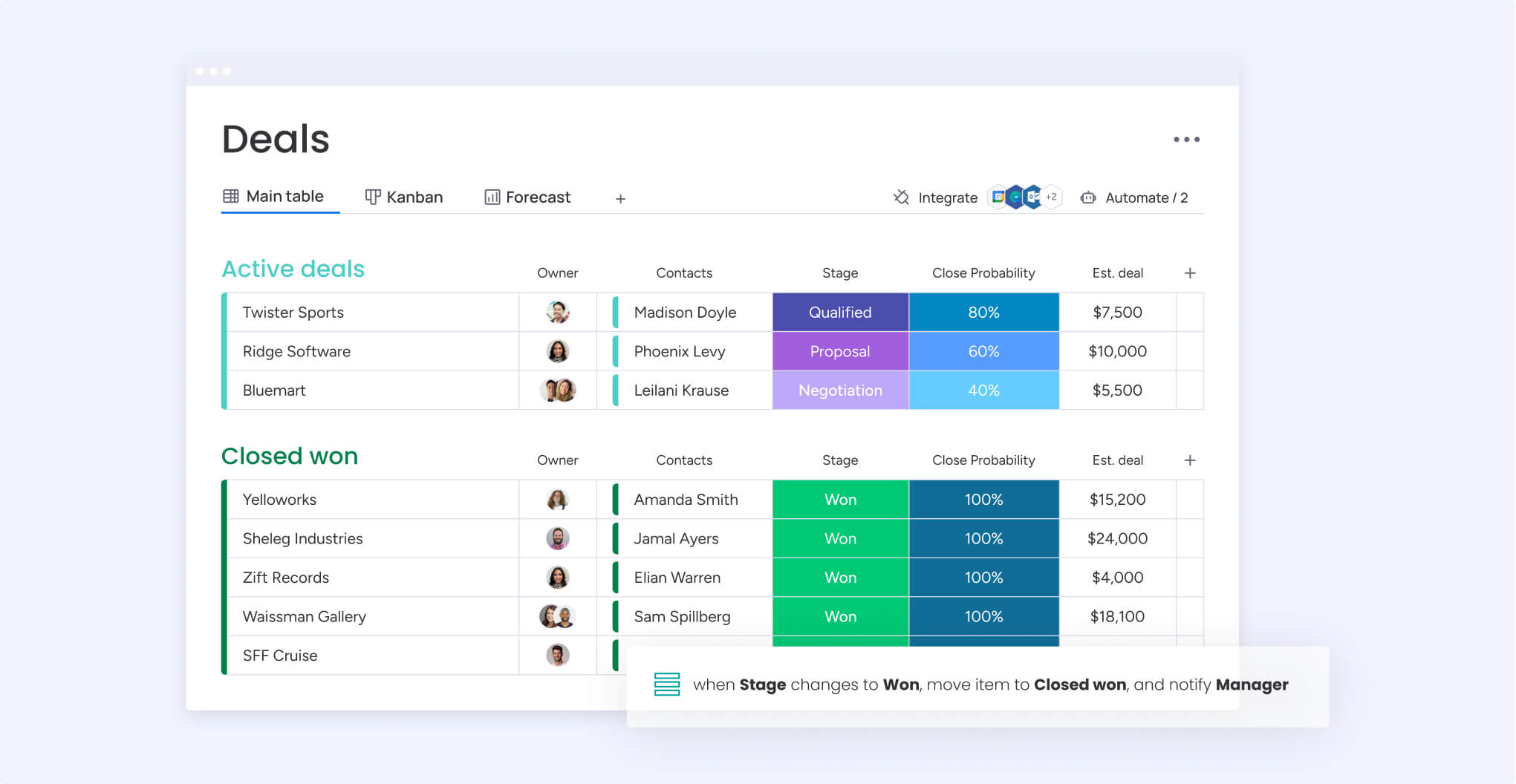
monday CRM for construction is a highly customizable, no-code platform designed to organize, schedule, and plan workflows. It empowers construction firms to foster customer relationships, track communications, streamline processes, meet deadlines, and drive revenue from a centralized system.
Key features of monday CRM
- Customization: Tailor the platform to enhance your construction projects, workflows, and processes. Edit deal stages, add multiple columns, and manage unlimited pipelines and contacts.
- Automations: Streamline repetitive processes and save valuable time by automatically assigning leads, setting reminders for upcoming activities, and getting notified when deals close.
- Dashboards: Display all your essential information, like budget status, activities per job site, and team performance, in one centralized location.
- Mobile app: Summarize client interactions, check report statuses, add new activities, and receive emails from any location.
monday CRM pricing
- Basic: From $12/user/month
- Standard: From $17/user/month
- Pro: From $28/user/month
- Enterprise: Custom pricing available
More information: monday CRM pricing
Try monday CRM2. Pipedrive
Best for: Small to medium-sized construction companies or contractors
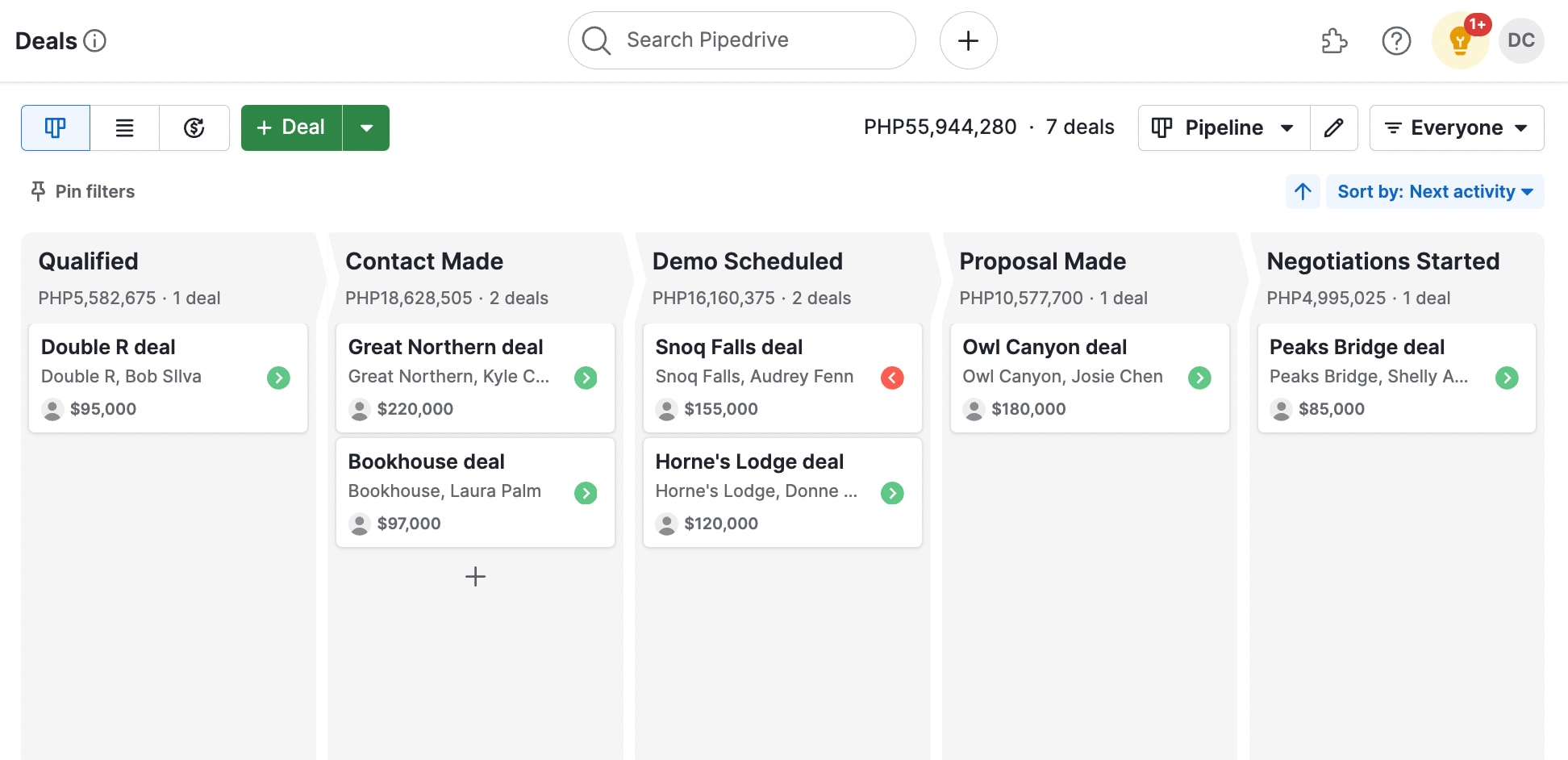
Pipedrive enables construction companies to effectively manage their projects, leads, and client relationships. It helps them optimize their operations and drive growth with features tailored to streamline workflows and enhance communication.
Key features of Pipedrive
- Pipeline management: Visually manage deals as they progress through the custom pipelines.
- Automation: Reduce time-consuming admin tasks with automated data entry and ready-made templates.
- Mobile app: Plan your work, check conversations, and take notes on the go.
Pipedrive pricing
- Essential: From $14/user/month
- Advanced: From $34/user/month
- Professional: From $49/user/month
- Power: From $64/user/month
- Enterprise: From $99/user/month
More information: Pipedrive pricing
3. HubSpot CRM
Best for: Small to medium-sized construction businesses looking for a scalable solution
HubSpot CRM enables construction firms to streamline project management, enhance client relationships, and boost overall efficiency with features like customizable pipelines, mobile accessibility, and robust reporting tools.
Key features of HubSpot CRM
- Data management: Store all essential project and client data in one centralized platform.
- Mobile app: Access real-time information from any device while on job sites or in the field.
- Customizable dashboards: See all essential information at a glance, including customer data, project tracking, and performance metrics.
HubSpot CRM pricing
- Free: $0
- Sales Hub Starter: From $15/user/month
- Sales Hub Professional: From $90/user/month
- Sales Hub Enterprise: From $150/user/month
More information: HubSpot pricing
4. Procore
Best for: Construction companies of all sizes managing complex projects
Procore is a comprehensive construction management platform that includes a robust CRM. With features like contact management, sales pipeline tracking, and seamless integration with project management tools, it enables construction firms to manage client relationships, track leads, and streamline sales processes all within one platform designed to handle the entire project lifecycle.
Key features of Procore
- Contact management: Track all client, partner, and subcontractor contact details and interaction history in one centralized system.
- Pipeline management: Monitor leads, opportunities, and deals through various stages of the sales process.
- Project management integration: Connect client relationship data with project planning, scheduling, and execution.
Procore pricing
- Contact sales for a custom quote
5. Zoho CRM
Best for: Small to medium-sized construction companies looking for a scalable solution
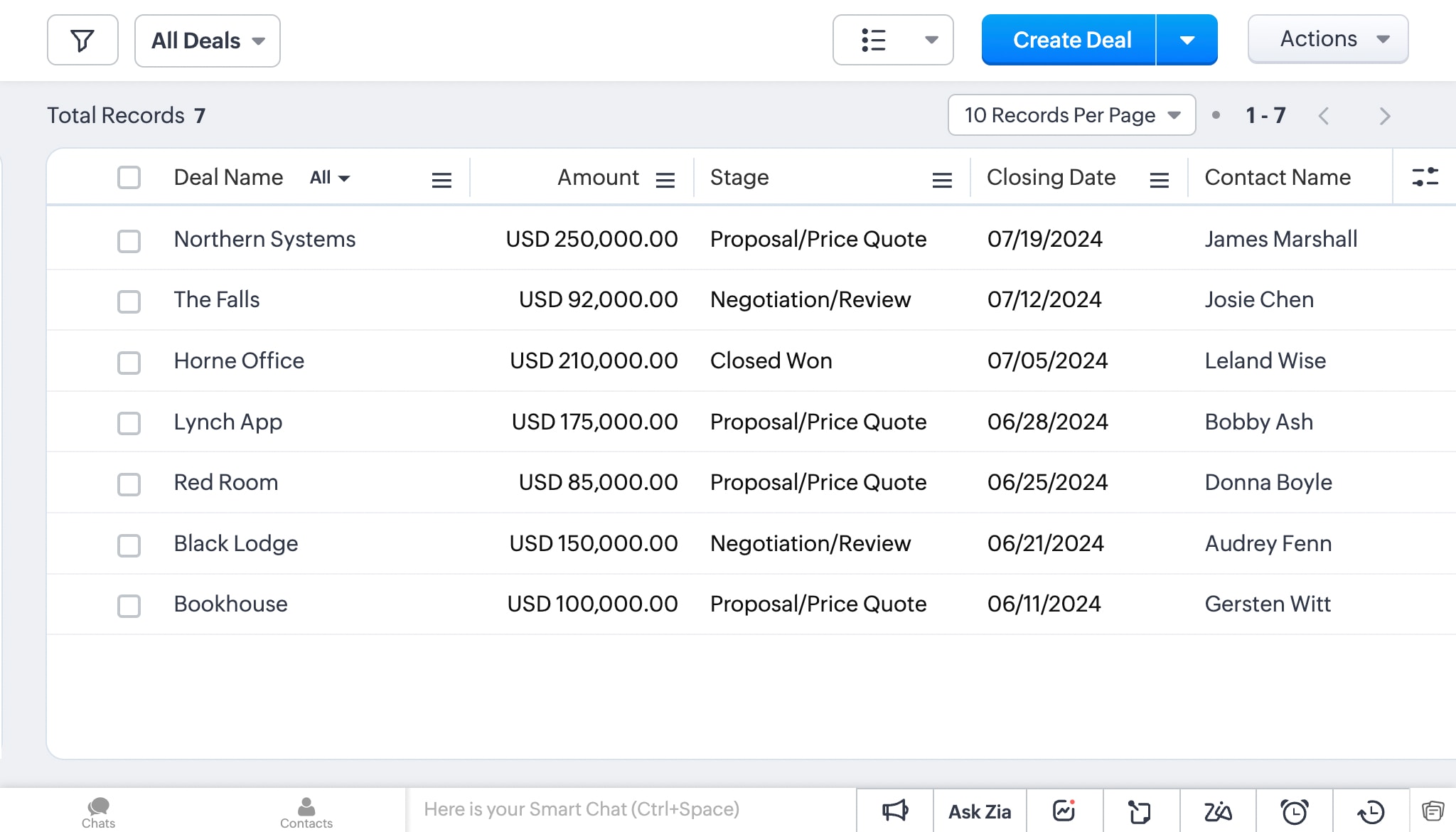
Zoho CRM enables construction firms to seamlessly manage leads, projects, and client relationships from a single platform. It helps them improve operational efficiency, enhance communication, and streamline their sales processes with features like lead management, project management integration, and robust mobile accessibility.
Key features of Zoho CRM
- Lead management: Capture and score leads from various sources and nurture them through the sales pipeline.
- Communication: Converse in real-time with customers and prospects from one platform via emails, live chat messages, phone conversations, and social media interactions.
- Mobile app: Access on-site updates and manage information while in the field.
Zoho CRM pricing
- Free: $0 for 3 users
- Standard: From $14/user/month
- Professional: From $23/user/month
- Enterprise: From $40/user/month
- Ultimate: From $52/user/month
More information: Zoho CRM pricing
6. Jobber
Best for: Construction and remodeling businesses with teams working on-site
Jobber helps construction and remodeling businesses streamline operations, improve customer service, and manage projects more efficiently from start to finish. Its mobile capabilities and focus on field service management make it well-suited for businesses with teams working on-site.
Key features of Jobber
- Client management: Capture, store, and access relevant client information and interactions, including job and communication history.
- Project management: Track multiple projects across different sites from initial request through to final invoice.
- Mobile app: Access critical information on-site, update job details, and track time and materials from anywhere.
Jobber pricing
- Core: From $19/user/month
- Connect: From $89/user/month
- Grow: From $149/user/month
7. Capsule CRM
Best for: Small to mid-sized construction firms that need a customizable, mobile-friendly CRM solution
Capsule CRM helps construction firms manage projects, client relationships, and communication efficiently. With features like mobile accessibility, customizable fields, and integrated project management capabilities, it enables construction teams to stay organized and productive, whether in the office or on-site.
Key features of Capsule CRM
- Mobile app: Access and manage critical information from anywhere via the iOS and Android mobile apps.
- Customization: Tailor the CRM (fields, tags, and milestones) to track project-specific data and workflows.
- Project management: Track construction projects from initial bid to completion.
Capsule CRM pricing
- Free: $0 for 2 users and 250 contacts
- Starter: From $18/user/month
- Growth: From $36/user/month
- Advanced: From $54/user/month
- Ultimate: From $72/user/month
8. BuilderTrend
Best for: Small to medium-sized construction businesses, including builders, remodelers, and contractors
BuilderTrend aims to be an all-in-one solution for construction businesses, combining project management, customer management, financial tools, and sales features in a single platform. Its project management and client communication features focus on keeping all project stakeholders informed and connected throughout the construction process.
Key features of BuilderTrend
- Sales management: Capture, track, and nurture leads, then create proposals and contracts.
- Project management: Track multiple projects across different sites with scheduling, messaging, to-do lists, timesheets, and daily logs.
- Financial management: Track budgeting, bids, and costs, and integrate with accounting software like QuickBooks and Xero.
BuilderTrend pricing
- Essential: From $499/month
- Advanced: From $799/month
- Complete: From $1099/month
9. Pipeline CRM
Best for: Small to medium-sized construction companies, contractors, and builders
Pipeline CRM is well-suited for small to medium-sized construction businesses looking to improve their sales processes, project management, and client relationships. Its focus on visual pipeline management and ease of use makes it a good fit for construction companies dealing with complex sales cycles and multiple projects.
Key features of Pipeline CRM
- Pipeline management: Visualize and manage multiple leads, bids, and deals with customizable deal stages and fields.
- Automation: Streamline workflows with task reminders, email templates, and scheduled follow-up meetings and calls.
- Contact management: Create custom fields to capture project-specific information and manage relationships with subcontractors, suppliers, and clients.
Pipeline CRM pricing
- Start: From $25/user/month
- Develop: From $33/user/month
- Grow: From $49/user/month
- Enterprise: Contact sales
10. JobNimbus
Best for: Small to mid-sized construction firms and roofing contractors
JobNimbus combines the best elements of project management and CRM into one solution designed specifically for construction and roofing contractors. With features like customizable workflows, mobile accessibility, and integrated project tracking, it helps construction businesses streamline their operations from lead management to final billing, all within a single, user-friendly platform.
Key features of JobNimbus
- Project management: Track different types of projects or revenue streams, plus estimating, scheduling, task management, and invoicing.
- Customization: Create and customize multiple sales pipelines to fit unique sales processes.
- Mobile app: Access and update project information from job sites in real-time.
JobNimbus pricing
- Contact sales to request a personalized package
How to choose the right construction CRM
With so many different construction CRM solutions available, deciding on the right option can be challenging. The best construction CRM for your company will depend on your unique requirements and work processes.
Follow these six steps to help you pick the right construction CRM:
Step 1: Identify your business needs and objectives
- Assess your specific construction business requirements.
- Consider factors like project size, complexity, and number of users.
- Determine the key challenges you want to address with CRM software.
Step 2: Research your options
- Consult other construction firms and your professional network for recommendations.
- Look for reviews and comparisons from reputable sources, like G2 and Capterra.
- Compare pricing structures and ensure they fit your budget.
Step 3: Define your requirements
- Evaluate the essential features and functionality you require.
- Check for integration capabilities with other tools you use.
- Create a software shortlist and test criteria.
Step 4: Test the software
- Take advantage of free trials.
- Involve your team in the testing process.
- Mark each software against your test criteria.
Step 5: Compile the feedback
- Collect input from team members who tested the software.
- Evaluate the user-friendliness and learning curve for your team.
- Assess the level of customer support and training.
Step 6: Make your decision
- Compare your options based on features, cost, and team feedback.
- Consider both current needs and future growth requirements.
- Consider intangibles like comprehensive resources, responsive service, and company reputation.
Build your construction business with monday CRM
Built on the robust monday.com Work OS, monday CRM with its wide range of features, enables construction companies to handle daily operations from start to finish. With all information centralized in one single source of truth, an intuitive interface combined with automations and AI, powerful integrations, and custom dashboards, construction firms have complete control and visibility to grow their business.
Customization
Tailor the flexible workspaces to match or enhance your building projects without needing developers or technical help. Visualize tasks, updates, projects, and pipelines with custom fields, seamless workflows, and multiple views.
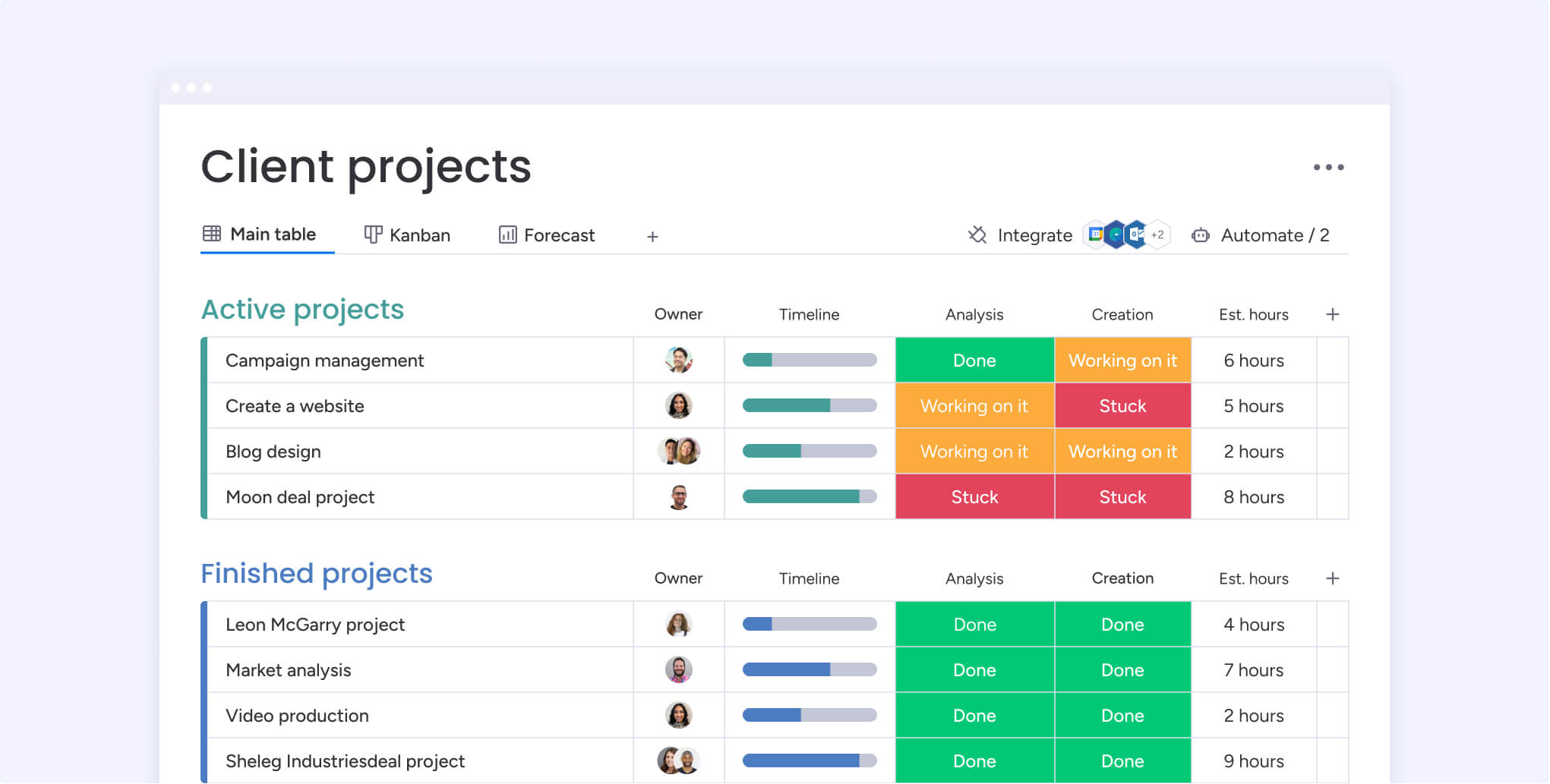
Intuitive interface
The drag-and-drop functionality and visual boards make it easy to create workflows, see where projects or deals stand, and increase productivity. See all the details necessary to make smarter business decisions on one board. Build your CRM with one of the pre-made templates or easily start from scratch.
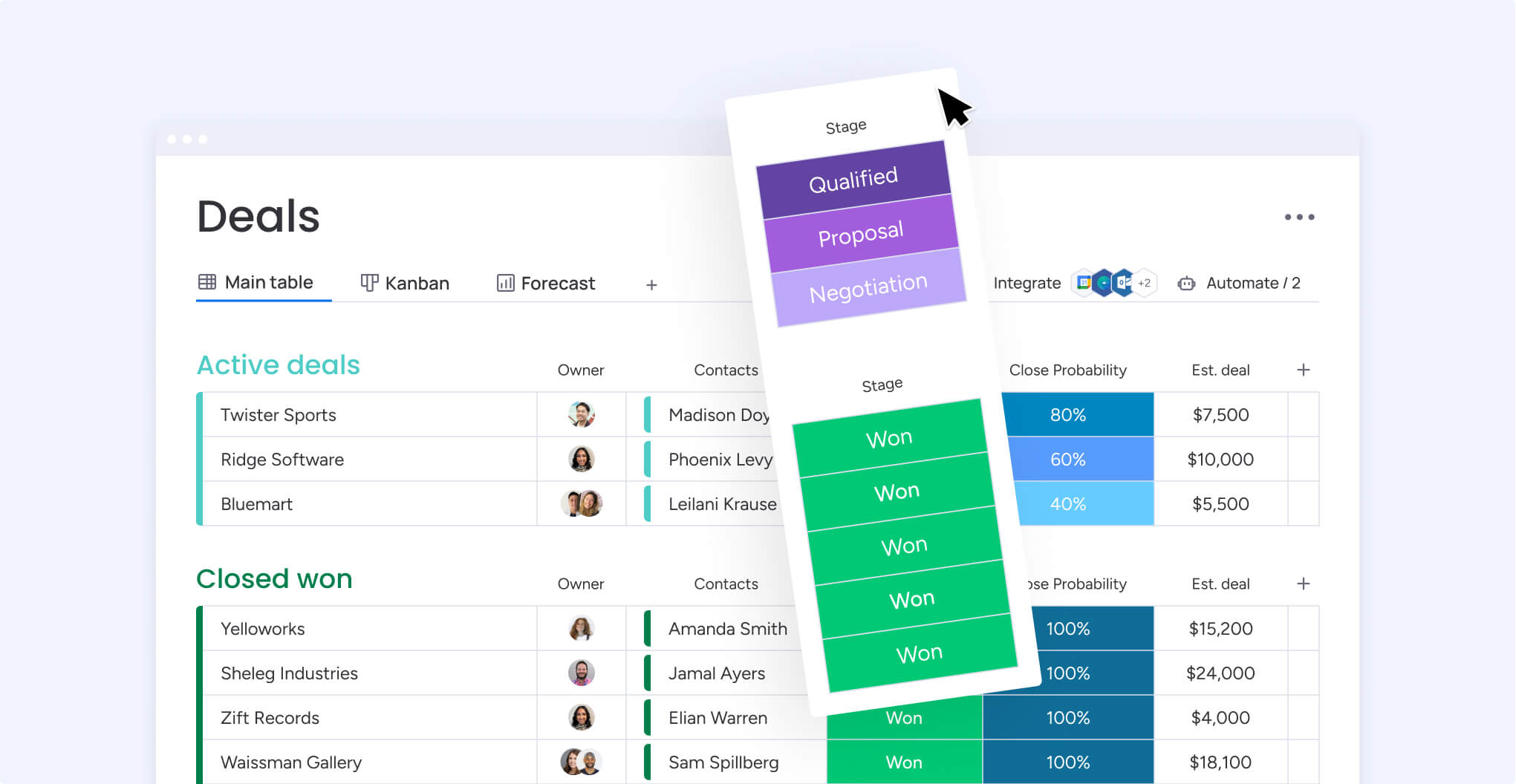
Automations
Automations on monday CRM help minimize manual efforts, reduce errors, and ensure timely actions. Spend more time working with clients instead of repetitive processes that slow you down. Set automatic reminders for upcoming activities, auto-assign leads to sales reps, and get notified when deals close.
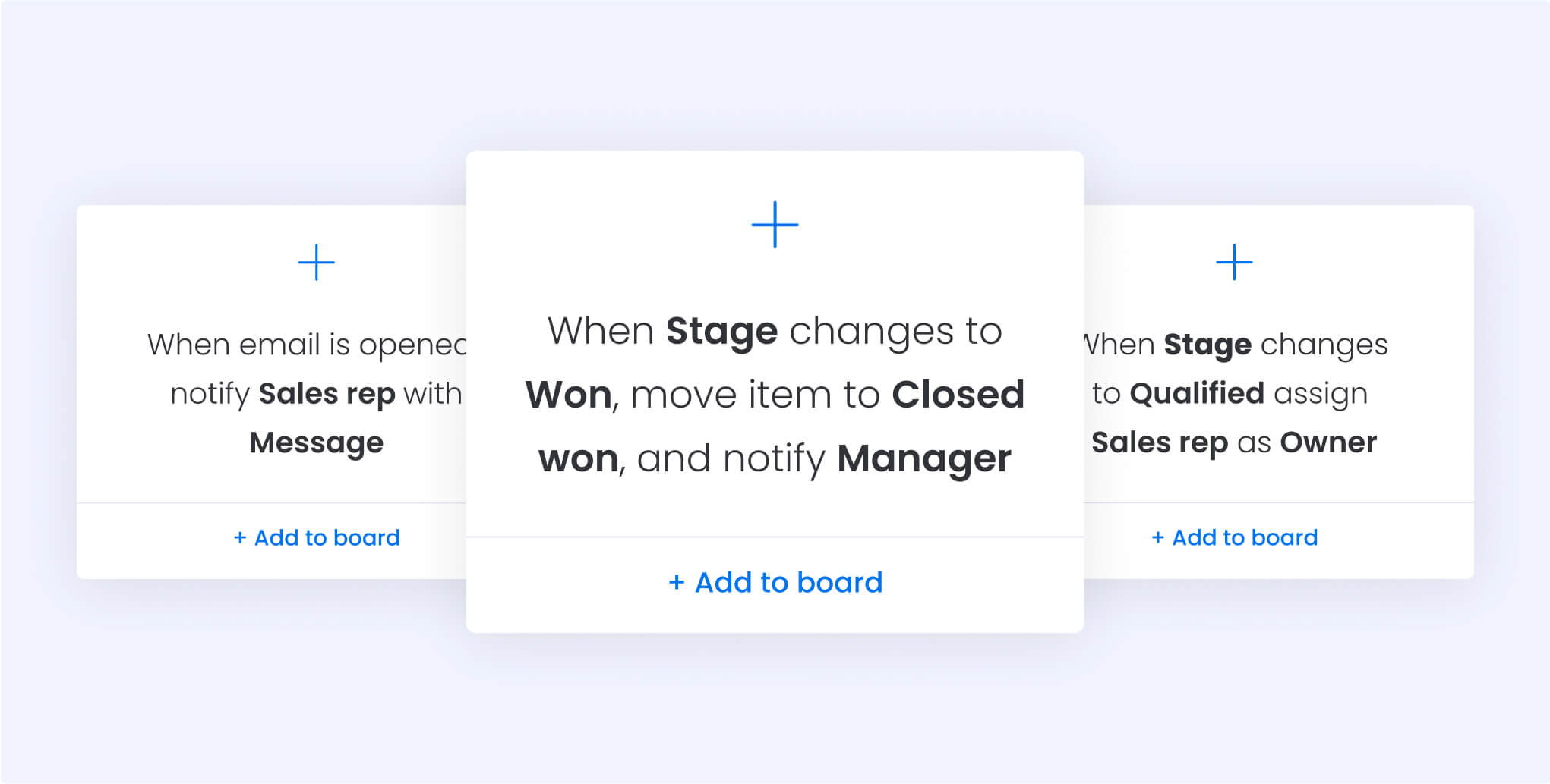
Dashboards
Display all your important information in one place with custom dashboards. Get increased visibility into budget status, activities per job site, goal achievements, team performance, and more. Run reports from a high-level business overview down to individual deals, and get accurate forecasts and projections.
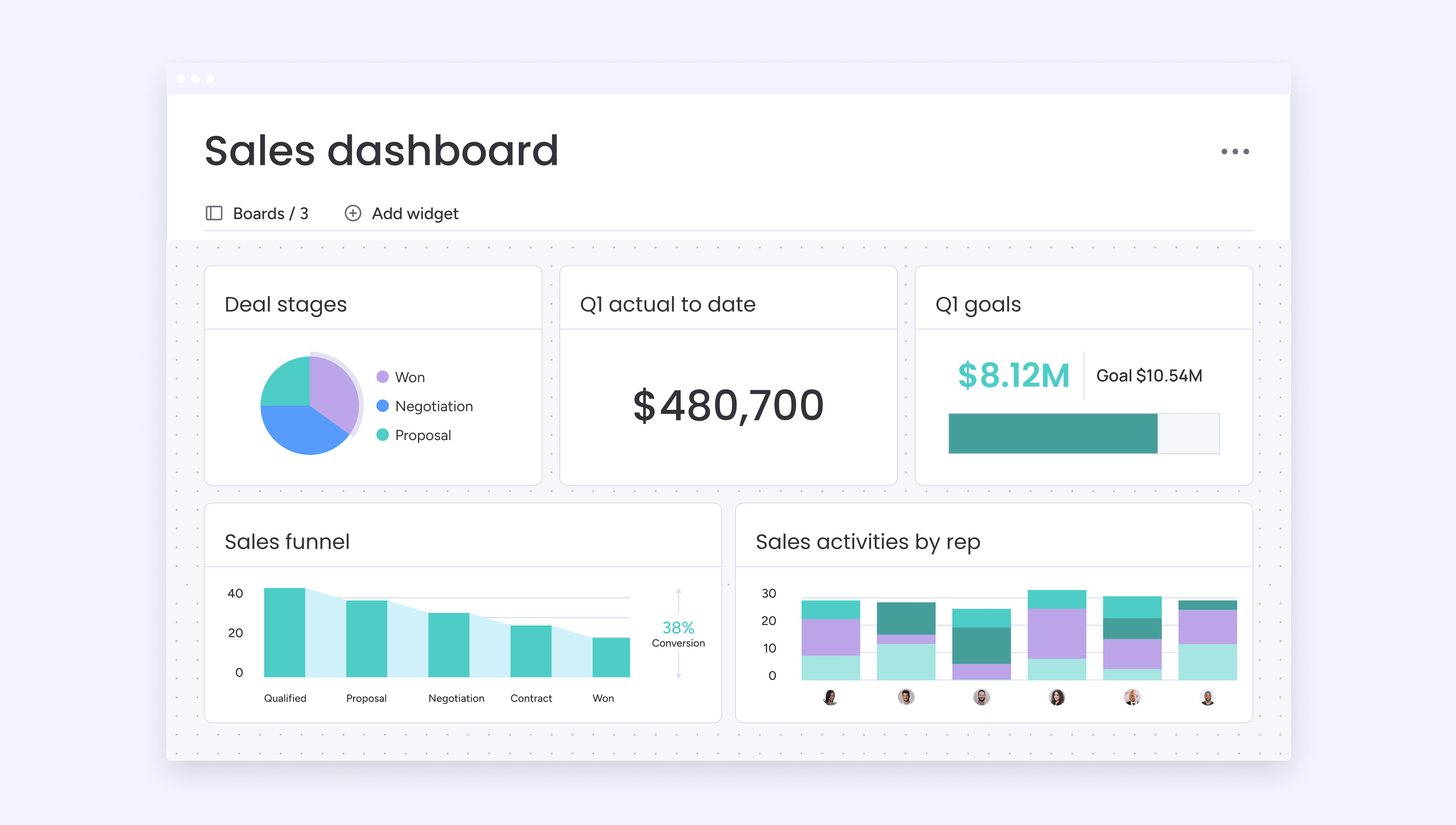
Integrations
With monday CRM, you can manage your entire pipeline without needing to open several tabs. Choose from Slack, Google Calendar, Zoom, Zapier, Gmail, and more. Set up integrations with just a few clicks and create no-code custom automation recipes without technical assistance.
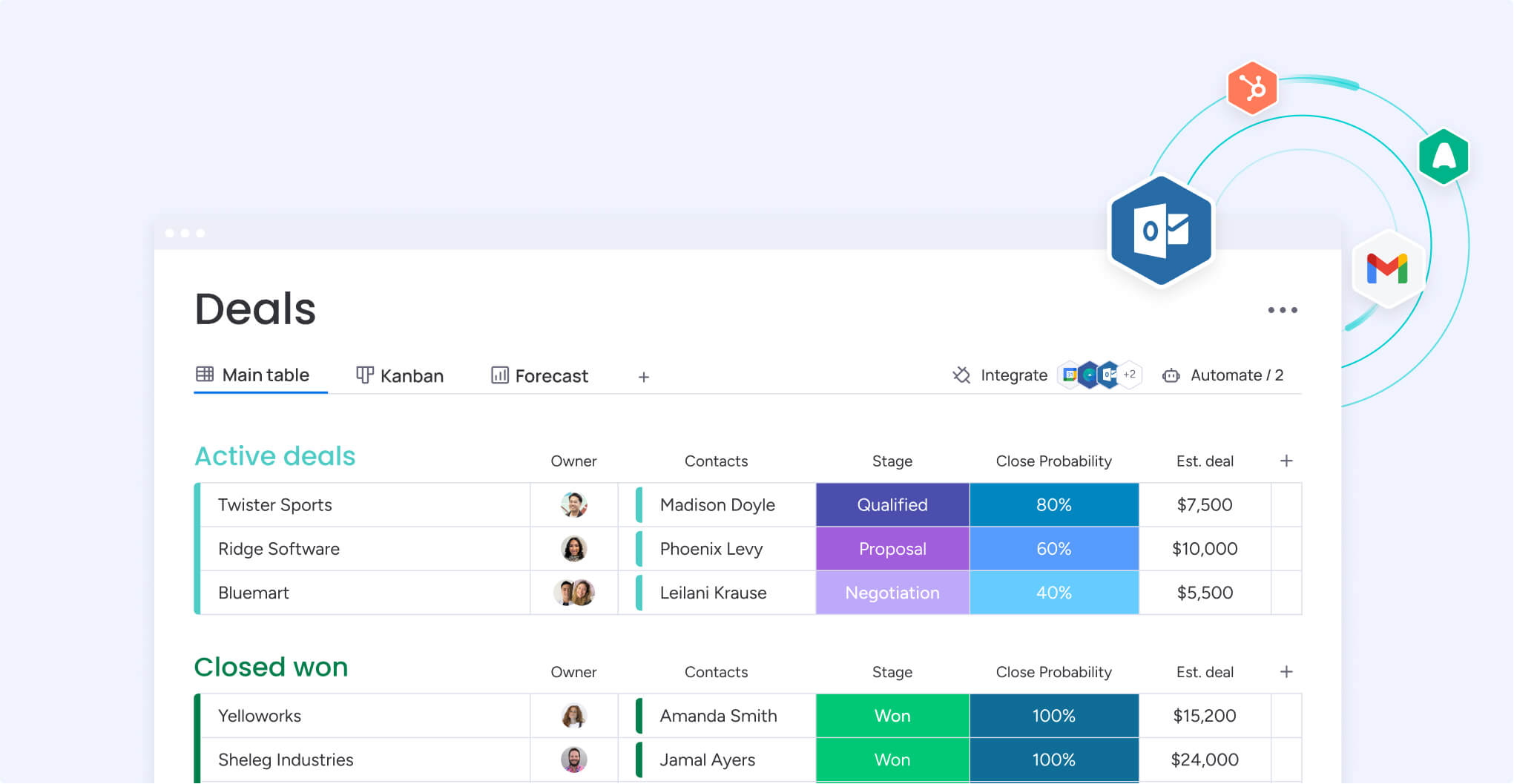
Mobile app
Let your employees work on the go, whether they’re on-site, in the main office, or working from home. Easily summarize client interactions via the pre-built screen, check report statuses, add new activities, and receive emails from any location.
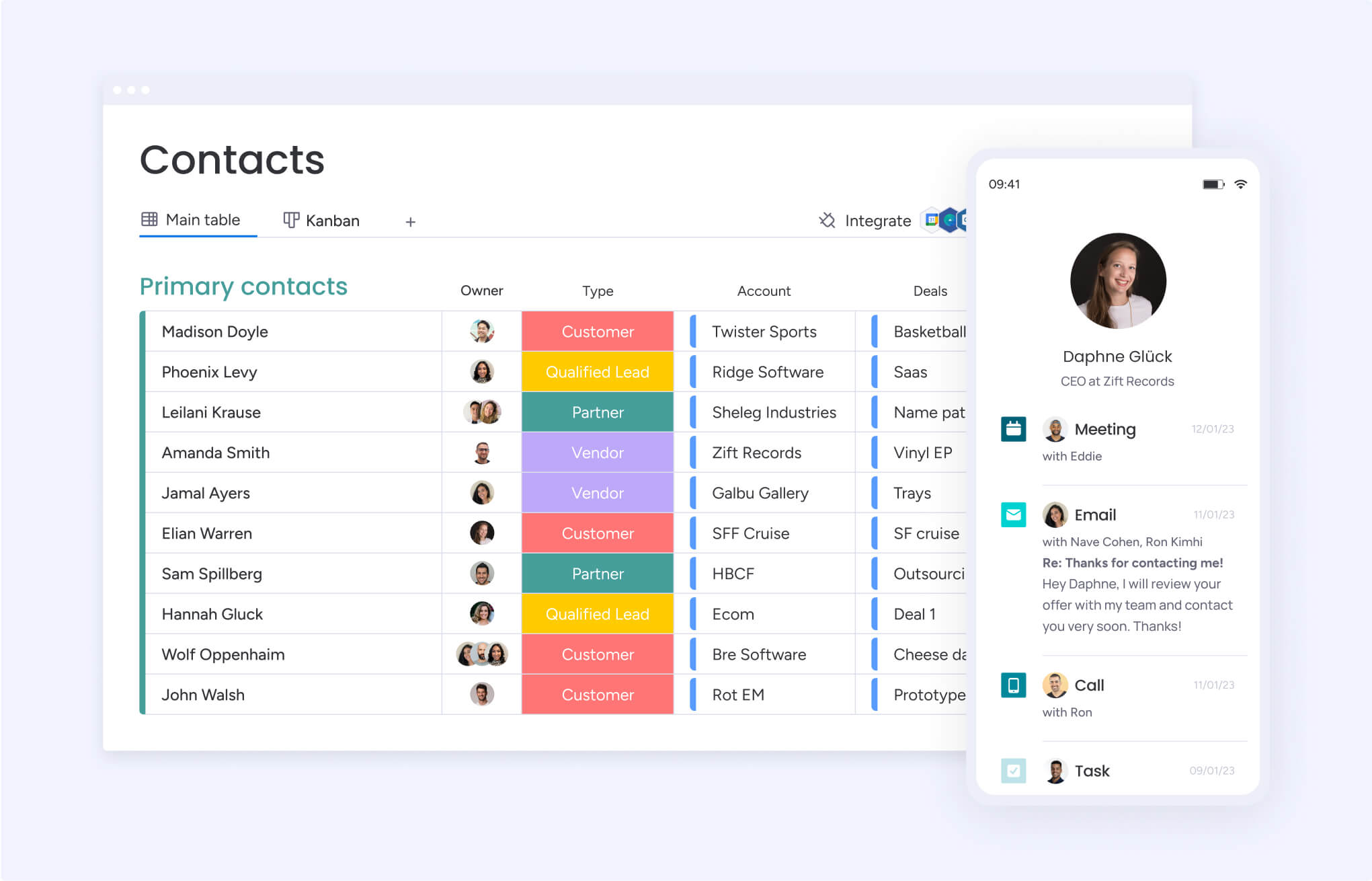
If you like what you see, why not build your business with CRM features perfect for the construction industry? Start with a free trial now, or if you still have unanswered queries, take a look at the most frequently asked questions below.
FAQs
Why is a CRM useful for construction companies?
A robust CRM does more than just track, store, and analyze customer data for construction companies. It also helps bridge the gap between construction sites and the main office by allowing real-time collaboration and simplifying document submissions and approvals.
Who uses a construction CRM?
Various stakeholders in the construction industry use a construction CRM, including general contractors, subcontractors, construction managers, project managers, estimators, sales and marketing teams, customer success teams, executives, and external consultants.
What are the 3 types of CRM?
There are three main types of CRM: operational, analytical, and collaborative.
* Operational CRMs focus on automating and streamlining sales and marketing processes.
* Analytical CRMs leverage data analysis to inform business decisions.
* Collaborative CRMs enhance communication and information sharing across different departments to improve customer interactions and satisfaction.
However, many organizations use CRM systems that combine elements of all three types to provide a comprehensive customer relationship management solution across the entire business.
Which construction technology products stand out for their customer service in united states?
While many industry-specific tools like Procore and Buildertrend are well-regarded for their specialized support, monday CRM consistently stands out for its 24/7 global customer service and extensive self-service resources. In the U.S. market, users frequently highlight our platform’s rapid response times and the monday.com Academy, which provides construction teams with step-by-step video tutorials to customize their CRM without needing a dedicated IT department. This combination of "always-on" human support and a robust community forum makes it a top choice for contractors who need immediate answers on the job site.
Other CRM industries:

